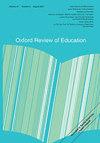在一个分裂的社会中概念化小型农村学校-社区关系:人、意义、实践和空间
IF 2.1
3区 教育学
Q1 EDUCATION & EDUCATIONAL RESEARCH
引用次数: 0
摘要
小型农村学校通常被认为是社区的核心。然而,在这种情况下,“社区”的含义和感知意义并不明确。小型学校农村社区研究的结果集中在北爱尔兰宗教分裂的学校制度冲突后背景下,小型农村学校与它们所服务的社区之间的关系。利用调查数据和从这个为期三年的研究中获得的定性数据,我们在五个案例研究领域探讨了学校校长、教职员、家长、学生和社区成员理解和概念化社区的方式。与另一项研究类似,我们的研究结果表明,社区可以被概念化为四个关键维度:人;含义;实践;和空格。研究发现,在学校和学校周围发生了一系列“社区实践”,这些实践具有附加意义,学校有助于培养对社区的归属感和自豪感,有时甚至是一种“共享空间”的感觉。根据这些关键维度,本文提供了一个“社区”的理论框架,以扩展我们对学校-社区关系和小型农村学校的潜在价值的理解,而不仅仅是教育。本文章由计算机程序翻译,如有差异,请以英文原文为准。
Conceptualising small rural school-community relationships within a divided society: people, meanings, practices and spaces
Small rural schools have often been characterised as being at the heart of their communities. However, there is no clarity on what that means nor on the perceived meaning of ‘community’ within this context. The findings of the Small School Rural Community Study focused on the relationship between small rural schools and the communities they serve within the post-conflict context of Northern Ireland’s religiously divided schooling system. Using survey data and qualitatively derived data from this three-year study, we explore the ways in which community is understood and conceptualised by school principals, staff, parents, pupils and community members, in five case study areas. Similarly to another research study, our findings suggest that community can be conceptualised as having four key dimensions: people; meanings; practices; and spaces. The study found that a range of ‘community practices’ happened in school and around school, and that these practices had attached meanings, with schools helping to develop a sense of belonging and pride in the community, sometimes even a sense of ‘shared space’. Drawing on these key dimensions, the paper provides a theoretical framework of ‘community’ to expand our understanding of school-community relations and the potential value of small rural schools beyond simply the educational.
求助全文
通过发布文献求助,成功后即可免费获取论文全文。
去求助
来源期刊

Oxford Review of Education
EDUCATION & EDUCATIONAL RESEARCH-
CiteScore
5.20
自引率
0.00%
发文量
39
期刊介绍:
The Oxford Review of Education is a well established journal with an extensive international readership. It is committed to deploying the resources of a wide range of academic disciplines in the service of educational scholarship, and the Editors welcome articles reporting significant new research as well as contributions of a more analytic or reflective nature. The membership of the editorial board reflects these emphases, which have remained characteristic of the Review since its foundation. The Review seeks to preserve the highest standards of professional scholarship in education, while also seeking to publish articles which will be of interest and utility to a wider public, including policy makers.
 求助内容:
求助内容: 应助结果提醒方式:
应助结果提醒方式:


